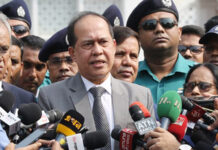
Amid media reports on unusual surge in the wealth of political leaders, technical problems have been created disrupting access to the personal information of candidates of the 10th parliamentary elections on the Election Commission website.
The EC website, www.ecs.gov.bd, on Tuesday stopped showing the personal information of the candidates described on their affidavits.
Official sources said the commission tactfully created the technical glitches blurring the web pages following a request from the ruling Awami League so that the information could not gathered, though there is a court direction to make the information public.
In wake of widespread media reports over the personal information of candidates, a team of the Awami League’s Election Conducting Committee led by MK Alamgir on Sunday requested Chief Election Commissioner Kazi Rakibuddin Ahmad to halt making the information public.
System Manager of the EC’s IT cell Rafiqul Islam said it is nothing but a technical problem which is usual as a large number of people try to have access to the information simultaneously.
About the AL’s request, CEC Rakibuddin on Monday said publishing the candidates’ personal information is not a new issue rather it is an old tradition. The commission will review the law before doing anything in this regard, he added.
Rakibuddin said this to reporters when he was asked whether the commission will respond positively to ruling Awami League’s request to stop publishing the affidavits of candidates.
The commission published eight types of information of all the candidates of the January 5 general election on its website after the submission of their nomination papers.
As per the article 12 (3b) of the Representation of the People Order 1972, every nomination paper shall be delivered along with an affidavit signed by the candidate which shall be include the eight types of information.
The information are (a) an attested copy of the certificate of his highest educational qualification, (b) whether at present he is accused of any criminal offence or not, (c) whether he has any past criminal record, and, if any, the judgement of the case, (d) description of his profession or business,
(e) probable sources of his income, (f) a statement of property or debt of his own or his dependents, (g) what promises he made before an election in which he was elected as a member in the past, and how many of those promises were fulfilled and (h) the amount of loan received by him alone, or jointly or by his dependents from any bank or financial institution, and the amount of loan received by him from any bank or financial institution as a Chairman, Managing Director or Director thereof.
On May 24, 2005, the High Court handed down a judgment asking the commission to receive and publish candidates’ eight personal information following a writ petition filed by three Supreme Court lawyers.
But chamber judge of the Appellate Division Joynal Abedin stayed the judgement on December 19, 2006, following another petition filed by Abu Safa, an inhabitant of Swandip, challenging the High Court’s judgement.
The full bench of the Appellate Division, headed by the then Chief Justice, finally upheld the High Court’s judgment on December 11, 2007.
The commission started publishing the affidavit of candidates in 2008 following the Supreme Court’s verdict.
Source: UNB Connect










The information was available for a short while and recently blocked by “glitches,” was the information copied by your organization or even by others.